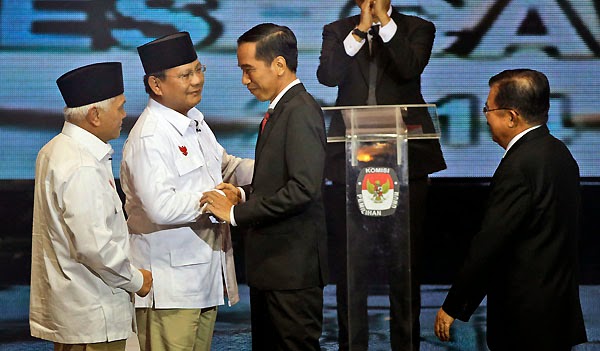What We Can Learn
Recently, I had the pleasure of witnessing two presidential debates in Indonesia. With the main elections coming up in July, both candidates, Prabowo Subianto and Joko Widodo (popularly known as Jokowi), have been slugging it out on and off the screens of Metro TV and tvOne.
The debates, then, offered them a chance to truly go toe to toe with one another. Though I have to admit to a lack of understanding and knowledge when it comes to Indonesian national politics, they have made for an interesting viewing all the same.
A lot of it mirrors the American political system, which is of no great surprise. The influence of American politics and culture in Indonesia cannot be underestimated, and I remember watching intently when the American candidates squared off against one another, especially in the last few elections; I am one who was intrigued by the election and subsequent reelection of Barack Obama as the supposed leader of the free world.
On the surface, at least, Jokowi seems some way ahead of Prabowo. The first debate involved their nominated deputies. Prabowo have teamed up with Hatta Rajasa, a man with a strong economics background, while Jusuf Kalla, who I remember largely as a man who sticks his nose into Malaysian politics every once in a while, is the chosen wingman for Jokowi.
It helps that for the most part, both Jokowi and Jusuf Kalla appear to be on the same wavelength. There were moments where the no. 2 candidate (Jokowi was ranked second behind the initial round of elections last month, while Prabowo was placed first) seemed content to let Jusuf Kalla step into the spotlight. Prabowo, on the other hand, was reluctant to relinquish it; at this level, that lack of cooperation between the presidential candidate and deputy can indicate something bigger.
Prabowo’s choice to wear what appears to be party shirts also seemed somewhat domestic, with Jokowi and Jusuf Kalla, in their dark suits and red ties, projecting a more stately appearance. It’s an interesting observation for me, and I wonder whether that is a deliberate strategy, given that one of the major disadvantages pointed out for Jokowi is his lack of national administrative experience and international panache. Many consider them to be prerequisites for someone who wishes to lead a country that straddles the edges of continents. The subsequent debate this past Sunday, with only the two of the presidential candidates of them flying solo, did little to truly change my train of thought.
I am sure more informed analysis can be found elsewhere. The main thing that kept popping into my head, however, was how this would have worked in Malaysia. Unlike Indonesia, Malaysia have largely kept in place the system and influences of British politics, and all the pros and cons that goes with it. However, the culture of constructive debating is still something that is not as prevalent within Malaysian society itself, let alone on its political stage.
It is unfortunate, for a strong debating skill is almost a requirement for those who wish to enter the highest levels of politics in the United Kingdom. Witness how the prime minister, David Cameron, can be incredibly combative in heated parliamentary arguments. I wonder this can be linked to our tendency to view this as something that lacks a strong traditional value i.e. it is not in our culture to be as confrontative as is required in the contexts of such debates.
Many Malaysians I come across prefer to whisper across their words of discontent amongst their own chosen kind, before shutting up their mouths and opinions when the spotlight is swung in their direction. There are many different factors for this, but I believe it comes down to an innate fear of being wrong. Perhaps more to the point, the institutionalisation of the fear of being ostracised is the drive behind this brand of omerta.
Of course, that is not to say that acts of debating do not really take place. I remember a number formal debates taking place between politicians and activists across the spectrum a number of years ago. However, they occurred largely outside the context of an immediate election, and so affected little for actual change to take place. Hence, the efforts of the likes of Khairy Jamaluddin, Ambiga Sreenevasan, Lim Guan Eng and others amounted to little more than public dick swinging contests to see who can gain the biggest cheers from those in attendance (metaphorically speaking, of course).
Many universities and colleges (and a number of schools) have also tried to educt a debate mentality through certain clubs and activities. It would also be useful to spend some time at a mamak; sooner or later, one of groups of people filling the tables nearby will be loud enough for you to detect the basic underpinnings of a debate. However, in such contexts, it is usually those who shout the loudest who will win.
Unfortunately, that is the conclusion I keep coming back to. During the first debate, the moderator actually made the effort to shut the audience up, informing them that they can only applaud on his cue, after the candidates have been given a fair enough chance to put their own views across.
All this was impressive in a constructive manner, and it is this lack of ability to truly engage in relevant discourses in a mature enough fashion, coupled with the lack of willingness to be confronted with even the slightest of possibilities of being wrong, that makes me feel, on this level, we have plenty of learning to do from our brothers and sisters across the straits of Malacca.
I hope you can prove me wrong, though.

Comments